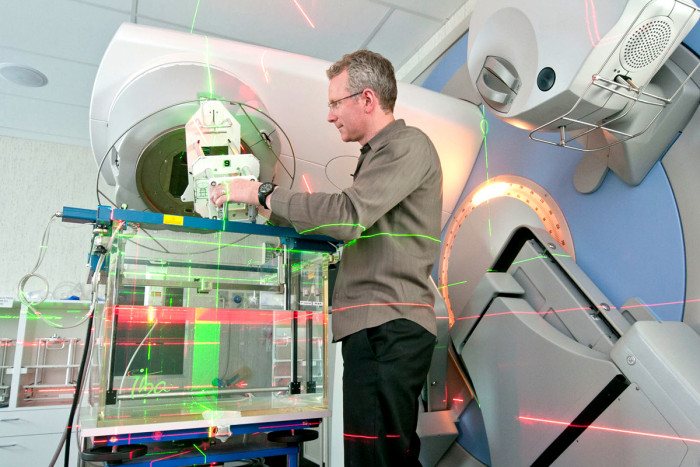Medical Physicist
Kaiahupūngao Whakaora
Medical physicists help plan radiation treatment for patients, check and monitor radiation equipment, and develop new treatment techniques.
Pay
Medical physicists usually earn
$65K-$118K per year
Experienced medical physicists usually earn
$122K-$161K per year
Source: APEX and Te Whatu Ora, 2023.
Job opportunities
Pay
Pay for medical physicists varies depending on skills, experience and qualifications.
- Medical physicists in training (registrars) working for Te Whatu Ora Health NZ usually earn between $65,000 and $85,000 a year.
- Mid-level medical physicists working for Te Whatu Ora usually earn between $103,000 and $118,000 a year.
- Senior medical physicists with extra clinical skills or management responsibilities working for Te Whatu Ora can earn from $122,000 to $161,000 a year.
Source: APEX and Te Whatu Ora Health NZ, 'Medical Physicists Collective Employment Agreement, July 2022 to August 2023'.
(This information is a guide only. Find out more about the sources of our pay information)
What you will do
Medical physicists may do some or all of the following:
- research and develop new equipment and techniques
- ensure that medical equipment is used safely and correctly
- order medical equipment
- monitor and test radiation equipment and dosage
- work with a medical team to create treatment plans for patients
- interact with patients as part of their radiation therapy treatment
- contribute to the design of new medical facilities.
Skills and knowledge
Medical physicists need to have knowledge of:
- physics as it applies to medicine
- maths and the scientific method
- the use of radiation to treat cancer or diagnose disease
- anatomy, physiology and radiation biology
- medical technology and equipment.
Working conditions
Medical physicists:
- usually work regular business hours, but may also work evenings and weekends
- work in hospitals or research departments in universities.
Entry requirements
To become a medical physicist you need to have a relevant undergraduate degree, such as one of the following:
- Bachelor of Science in Physics (Medical Physics and Imaging Technology)
- Bachelor of Science in Physics
- Bachelor of Engineering with a strong maths and physics component.
You then enter specialist training and work experience, involving:
- a Masters of Science in Medical Physics
- a five-year clinical Training, Education and Accreditation Programme (TEAP), done in conjunction with the Master's degree and specialising in one of three areas, radiation oncology medical physics, diagnostic imaging medical physics or nuclear medicine physics
- accreditation with the Australasian College of Physical Scientists and Engineers in Medicine (ACPSEM).
Secondary education
NCEA Level 3 is required to enter tertiary training. Useful subjects include biology, chemistry, digital technologies, maths, physics, and construction and mechanical technologies.
Personal requirements
Medical physicists need to be:
- skilled at research, and at analysing and interpreting research results
- accurate, with an eye for detail
- well organised
- good at communicating
- good at solving problems
- persistent and patient
- able to work well independently and as part of a team.
Useful experience
Useful experience for medical physicists includes:
- any scientific research work
- work with medical equipment or electronics
- engineering work
- computer programming and coding.
Physical requirements
Medical physicists need to have good eyesight (with or without corrective lenses).
Find out more about training
- Australasian College of Physical Scientists and Engineers in Medicine
- (0061) 02 8305 3900 - admin.support@acpsem.org.au - www.acpsem.org.nz
What are the chances of getting a job?
Strong demand for medical physicists
Chances of getting a job as a qualified medical physicist are good due to:
- an ageing population with more health problems
- not enough people training as medical physicists to meet demand
- an ageing workforce, especially in diagnostic imaging
- a high turnover, as medical physicists often leave to work overseas for better pay.
Medical physicist appears on Immigration New Zealand's long-term skill shortage list. This means the Government is actively encouraging skilled medical physicists from overseas to work in New Zealand.
According to the Census, 144 medical physicists worked in New Zealand in 2018.
Competition for entry to specialist training
There is competition for hospital registrar training positions for the specialist medical physicist Masters programme because there are often more applicants than positions available.
You can increase your chances of getting a medical physicist registrar position if you:
- have consistently good grades in your undergraduate physics (or related) degree
- have good communication and problem-solving skills
- get involved in a relevant university summer research project
- visit a hospital medical physics department
- attend the annual medical physics conference
- apply for a scholarship through the ACPSEM NZ branch.
Most medical physicists work in hospitals
Medical physicists may also work for:
- universities and tertiary institutions (doing research and teaching)
- research institutes and laboratories
- medical equipment manufacturers
- private companies providing contracting services for imaging quality control or radiation safety advice.
Sources
- Day, R, senior medical physicist, Capital and Coast District Health Board, careers.govt.nz interview, March 2021.
- Immigration New Zealand, 'Long Term Skill Shortage List', 27 May 2019, (www.immigration.govt.nz).
- Moggré, A, senior radiation oncology medical physicist, Canterbury District Health Board, careers.govt.nz interview, April 2021.
- Stats NZ, '2018 Census Data', 2019.
(This information is a guide only. Find out more about the sources of our job opportunities information)
Progression and specialisations
Medical physicists may progress to doing research in their clinical practice or move into management roles.
Medical physicists working in hospitals may specialise in:
- treatment planning
- radiation safety
- image quality
- linear accelerator management.
Medical physicists may also progress to jobs in areas such as:
- teaching or research in universities
- making medical equipment
- consulting on new equipment and technology to be used in hospitals.
Last updated 12 December 2023


